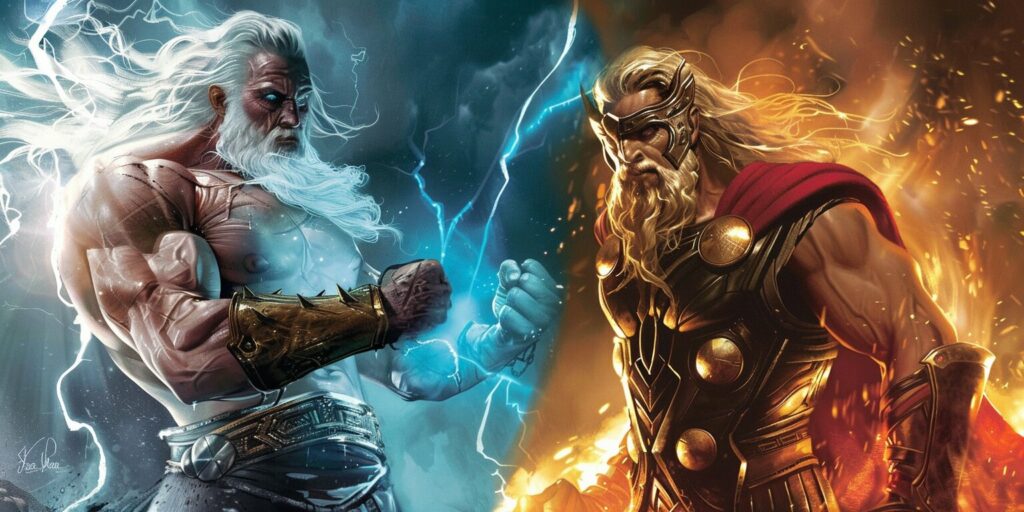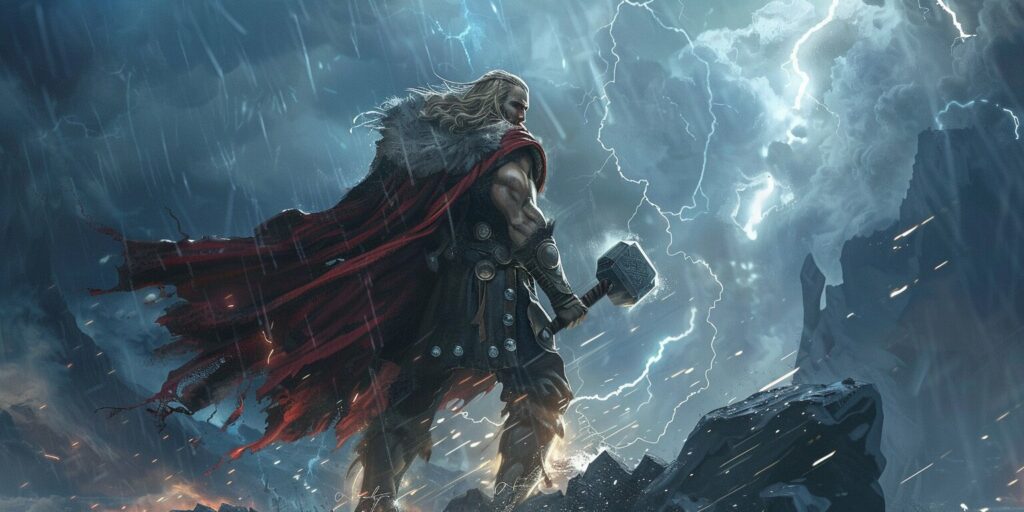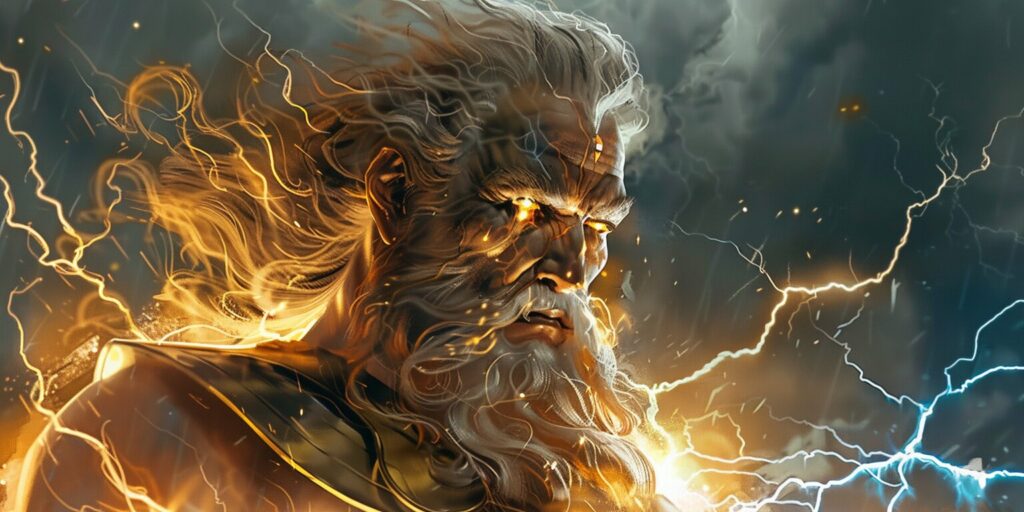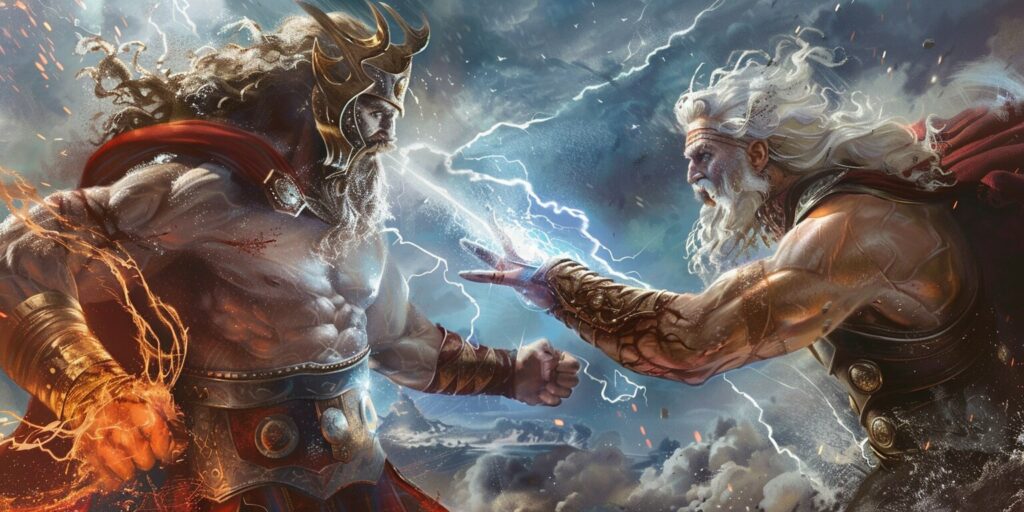Aesir Gods, Mjölnir (Thor’s Hammer), Norse Gods, Norse Mythology, Ragnarok, Tales of the Gods, Thor
Clash of the Titans: Zeus vs. Thor – Who Holds Supreme Power?
Zeus and Thor, two of the most powerful deities in Greek and Norse mythology, have long been the subject of intense debate among enthusiasts of these ancient traditions, especially regarding who would win if the two were to engage in a mythical battle. As the god of thunder in the Greek pantheon, Zeus is renowned for his mighty lightning bolts and his ability to control the elements. In contrast, Thor, the god of thunder in Norse mythology, is known for his immense physical prowess and his legendary hammer, Mjolnir. This epic clash between these two towering figures raises the question: Is Thor stronger than Zeus?
Who is Stronger: Thor or Zeus?
In mythology, the clash between the Norse god Thor and the Greek god Zeus has been a subject of intense debate and speculation. Both deities are revered as powerful thunder gods, commanding the elements and wielding formidable weapons. Examining their mythological backgrounds and the feats of strength associated with each deity is essential to determine who holds the supreme power.
Comparing the Powers of Thor and Zeus
Let’s delve deeper into their powers to fully comprehend the difference between Zeus and Thor. Thor, the mighty god of thunder in the Norse pantheon, is renowned for his incredible physical strength and his legendary hammer, Mjolnir. With the ability to control lightning and summon powerful storms, Thor’s prowess in battle is unparalleled. He is often depicted as a towering, muscular figure, capable of feats of strength that would challenge even the most formidable of giants, leading many to speculate that Thor could indeed be stronger than many of his divine counterparts.
In contrast, Zeus, the king of the Greek gods, is renowned for his mastery of the elements and his ability to unleash devastating lightning bolts. As the ruler of Mount Olympus, Zeus commands respect and fear from the other deities in the Greek pantheon. His power is often demonstrated through his control over the weather, ability to transform into various forms, and unrivaled authority over the other Olympian gods.
Feats of Strength: Thor vs. Zeus

When it comes to feats of strength, both Thor and Zeus have impressive accomplishments to their names. Thor is known for his ability to lift and wield the mighty Mjolnir, a heavy hammer that can only be wielded by the god himself. He has also been credited with feats such as defeating the serpent Jörmungandr, the protector of Midgard, and holding his own against the mightiest of giants in the Norse pantheon.
On the other hand, Zeus is renowned for his ability to hurl powerful lightning bolts that can devastate entire landscapes. He has also demonstrated his strength through his ability to overthrow his father, Cronus, and establish himself as the ruler of the Olympian gods. Additionally, Zeus has been known to transform into various forms, such as a swan or a bull, to pursue his romantic interests, showcasing his impressive shapeshifting abilities.
Analysis of Norse and Greek Mythological Influence
The influence of Norse and Greek mythology on the perception of Thor and Zeus’s strength extends beyond their individual feats. The cultural and historical contexts in which these deities were revered also significantly shaped their perceived power. While Thor and Zeus are considered supreme thunder gods, the Norse and Greek pantheons differ in their mythological structures and the relative importance of their respective deities.
In the Norse tradition, Thor is often seen as the protector of Asgard and the defender of the Æsir, the ruling clan of the Norse gods. His role as a warrior-god and his close ties to the concept of fate and destiny in the Norse cosmology contribute to his perceived might and significance, with some believing Thor could indeed be the stronger combatant in a face-off with Zeus. Conversely, in the Greek tradition, Zeus is the king of the gods, wielding ultimate authority over the Olympian pantheon. His ability to manipulate the elements and his role as the arbiter of justice and morality cement his status as the most powerful deity in the Greek pantheon.
Could Thor Defeat Zeus in Battle?
Considering Thor and Zeus’s immense power and abilities, a hypothetical showdown would be a truly epic clash of the Titans. While both deities possess formidable combat skills and impressive supernatural powers, several factors come into play when contemplating the outcome of such a battle.
Theoretical Showdown: Thor vs. Zeus
In a theoretical battle between the god of thunder from the Norse pantheon and the god of thunder from the Greek pantheon, the scales would tip in favor of the one with the greater overall strength, resilience, and strategic prowess. Thor, with his legendary hammer Mjolnir and unparalleled physical might, would pose a formidable challenge to the lightning-wielding Zeus. However, Zeus’ mastery of the elements and his ability to control the very fabric of the universe could give him a decisive advantage.
Contemplating the Immortality Factor
One crucial factor to consider is the question of immortality. As deities, both Thor and Zeus are essentially immortal, possessing the ability to regenerate from injuries and withstand the ravages of time. This could lead to a prolonged and evenly matched battle, with neither combatant able to achieve a decisive victory through sheer force alone.
Discussing Thor and Zeus’ Warrior Abilities
Regarding warrior abilities, Thor and Zeus are formidable in their own right, but debates about who would win Zeus or Thor continue to intrigue mythology fans. Thor is renowned for his ferocity in battle, unwavering courage, and mastery of various weapons, including his mighty Mjolnir. On the other hand, Zeus is a strategic genius, able to command the elements and employ a range of divine powers to overwhelm his opponents, leading some to argue that Zeus would probably outmaneuver Thor in a battle of wits and power. This balance of physical prowess and strategic brilliance could make the outcome of their clash uncertain.
Comparing Norse and Greek Mythology
To fully understand the dynamic between Thor and Zeus, exploring the broader contexts of their respective mythological traditions—the Norse and Greek pantheons is necessary. While both deities are revered as the gods of thunder, their origins, attributes, and mythological narratives differ significantly.
Exploring the Pantheons: Norse vs. Greek
The Norse pantheon, centered in Asgard, is led by the mighty Odin, father of Thor, whose strength and warrior prowess raise questions about whether Thor could be stronger than other godly figures, including Zeus. In this realm, Thor stands as the embodiment of strength, courage, and protection, wielding his legendary hammer, Mjolnir, to defend the Asgardians and combat the forces of chaos and destruction. The Norse gods are deeply tied to the concept of Ragnarok, the foretold apocalyptic battle that will shape the fate of the nine realms.
In contrast, the Greek pantheon, led by Zeus, resides on Mount Olympus. As the king of the gods, Zeus commands an array of powerful Olympian deities, each with their own unique domains and abilities. Zeus is revered as the god of the sky, thunder, and lightning, wielding the thunderbolt as his primary weapon. The Greek mythology is deeply rooted in heroic tales, divine interventions, and the exploration of the human condition.
Key Attributes of Thor and Zeus in Mythological Lore
The Thor vs Zeus mythology is an interesting topic to explore. Thor, the Norse god of thunder, is renowned for his immense physical strength, unwavering courage, and his ability to wield the mighty Mjolnir. He is often depicted as a protector of the Asgardians and a defender against the forces of evil, including the giants and trolls that threaten the Nine Realms. Thor’s power is often associated with storms, lightning, and the natural world.

On the other hand, Zeus, the Greek god of the sky and thunder, is renowned for his supreme authority and command over the Olympian pantheon. He is known for his mighty thunderbolts, which he wields to assert his dominance and punish those who defy him. Zeus’s power is often associated with the heavens, the weather, and the natural world.
Differences in Thunder Gods: Thor and Zeus
While Thor and Zeus are gods of thunder, they have distinct differences in their mythological representations and roles within their respective pantheons. Thor is often portrayed as a warrior-like figure, focused on physical strength and the protection of the Asgardians, while Zeus is more often seen as a regal and authoritative ruler, wielding supreme power over the Olympian deities and mortals. Additionally, the Norse and Greek mythologies have vastly different narratives, with Ragnarok playing a central role in the former and the heroic tales and divine interventions being more prominent in the latter.
Analysis of Key Mythological Figures: Thor and Zeus
As we delve deeper into the epic clash between the Norse god Thor and the Greek god Zeus, examining the broader mythological context surrounding these two powerful deities is crucial. Many wonder if in a battle, Thor could possibly outmatch Zeus, considering their unique abilities. Their rivalry, the weapons they wield, and their roles in the prophesied Ragnarok all contribute to the intricate tapestry of their mythological legacies.
Examining the Rivalry Between Thor and Zeus
While Thor and Zeus are considered the gods of thunder in their respective pantheons, their relationship is often depicted as rivalry and competition, with fans and scholars frequently debating who would win in a direct clash. Both deities are known for their unparalleled strength, ability to control the elements, and roles as protectors of their respective realms – Asgard for Thor and Mount Olympus for Zeus.
This inherent rivalry between the Norse and Greek thunder gods, Thor and Zeus, has been a subject of fascination for scholars and enthusiasts alike. Discussions often focus on who is stronger than Thor or whether Zeus would probably win in a direct confrontation. Some myths suggest that Thor and Zeus have even engaged in direct confrontations, showcasing their immense power and the potential for a cataclysmic clash between the two titans.
Reviewing the Weapons of Thor and Zeus
The legendary weapons wielded by Thor and Zeus are also central to their mythological narratives and the ongoing debate surrounding their comparative strength. Thor’s hammer, Mjolnir, is renowned for its ability to summon lightning and thunder and its devastating destructive power. In contrast, Zeus’s thunderbolts are often depicted as the ultimate expression of his divine authority and mastery over the elements.

The possession of these formidable weapons adds to the complexity of the Thor-Zeus rivalry, as each deity’s arsenal is imbued with unique properties and abilities that could potentially tip the scales in a hypothetical battle.
The Role of Thor and Zeus in Ragnarok
In the broader context of Norse mythology, Thor is prophesied to play a crucial role in the cataclysmic event known as Ragnarok – the foretold twilight of the gods and the end of the world as we know it. Similarly, in Greek mythology, Zeus is often associated with the ultimate fate of the Olympian pantheon and the potential for their own version of a cosmic reckoning, leading some to say Zeus would probably emerge victorious in a divine conflict.
The interplay between the roles of Thor and Zeus in these apocalyptic narratives further highlights the significance of their mythological rivalry, as their actions and decisions could ultimately shape the course of their respective pantheons’ destinies.
Summary
In the epic clash between the Greek god Zeus and the Norse god Thor, the question of who holds the supreme power remains a subject of intense debate and speculation. Both deities possess immense strength, supernatural abilities, and a rich mythological legacy, making it challenging to conclusively determine the victor in a hypothetical battle. While Thor’s physical prowess and command of the mighty Mjolnir hammer are undeniable, Zeus’s mastery of the elements and his status as the ruler of the Greek pantheon cannot be overlooked.
Ultimately, the outcome of a confrontation between Thor and Zeus would depend on a multitude of factors, including the specific circumstances of the battle, the location, and the rules of engagement. The unique attributes and mythological influences of these two titans, Thor and Zeus, must be carefully weighed to arrive at a definitive conclusion about who would emerge stronger or if Thor could potentially outshine Zeus in a showdown. Nevertheless, the epic clash between the god of thunder from the Norse and Greek traditions remains a captivating and enduring subject of fascination for scholars, enthusiasts, and fans of mythology alike.
As the debate continues, one thing is certain: the sheer power and grandeur of these two legendary figures, Thor and Zeus, have solidified their place as towering icons in the pantheon of mythological deities, inspiring awe and wonder across cultures and generations.

